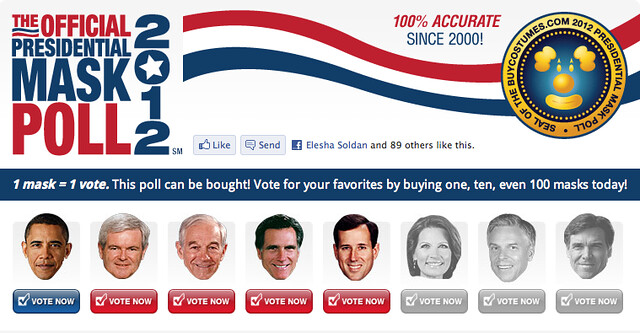Polling has an impact on a variety of industries. My background in marketing and public relations has certainly required use of polls. For online retailers a "fun" poll on their website creates an interaction with a visitor that has the potential for them to share the poll with friends. These less sophisticated, entertainment type polls can also be used to create media buzz. As noted in the New York Times polling standards, datal like this wouldn't be the model of accuracy, but it could be used in discussion and to bring some levity to the commentary. Since 2000, BuyCostumes.com has been able to use this poll for mentions in national media with great success.
While a poll regarding mask sales is interesting, political polls hold much higher requirements in the selection of their sample group, method of data collection and analysis for presentation of their findings. While watching the presentation of the February 2012 "On the Issues: Marquette Law Poll" in class, my curiosity was piqued when Charles Franklin highlighted how wording impacts responses. In the presentation, Franklin showed the question regarding iron-ore mining in Northern Wisconsin as posed by the Marquette Law Poll compared to the question the PPP used on the same issue. The differences in wording enforced the responsibility of the poll conductor to remove bias and avoid inferring which answer is "right". As a journalist, the level of insight into how a poll is conducted can also mean maintaining a high level of skepticism.
To help avoid the use of lower quality polling data, most organizations set standards that exclude new media data collection. In preparation for Franklin's visit to my JOUR4953 class, I was motivated by the February 15, 2012 post on his blog, PollsandVotes.com, "...a tremendous number of state polls are not reportable because they lack live interviewers, randomized in-household selection, and omit cell phones." If an online poll can provide unbiased questions, target a legitimate sample and have a secure method of reporting, I agree with Franklin's position that new methods can be used as appropriate sources. Clearly a retailer poll isn't where I would look to collect information to report on Super Tuesday's voting, but the option to refer to online polls shouldn't be eliminated. Fewer and fewer people have landlines and of that number, many are unwilling to participate in polls. With some enforceable standards and transparency into the collection methods, online polling will take a place as a valid resource.
While a poll regarding mask sales is interesting, political polls hold much higher requirements in the selection of their sample group, method of data collection and analysis for presentation of their findings. While watching the presentation of the February 2012 "On the Issues: Marquette Law Poll" in class, my curiosity was piqued when Charles Franklin highlighted how wording impacts responses. In the presentation, Franklin showed the question regarding iron-ore mining in Northern Wisconsin as posed by the Marquette Law Poll compared to the question the PPP used on the same issue. The differences in wording enforced the responsibility of the poll conductor to remove bias and avoid inferring which answer is "right". As a journalist, the level of insight into how a poll is conducted can also mean maintaining a high level of skepticism.
To help avoid the use of lower quality polling data, most organizations set standards that exclude new media data collection. In preparation for Franklin's visit to my JOUR4953 class, I was motivated by the February 15, 2012 post on his blog, PollsandVotes.com, "...a tremendous number of state polls are not reportable because they lack live interviewers, randomized in-household selection, and omit cell phones." If an online poll can provide unbiased questions, target a legitimate sample and have a secure method of reporting, I agree with Franklin's position that new methods can be used as appropriate sources. Clearly a retailer poll isn't where I would look to collect information to report on Super Tuesday's voting, but the option to refer to online polls shouldn't be eliminated. Fewer and fewer people have landlines and of that number, many are unwilling to participate in polls. With some enforceable standards and transparency into the collection methods, online polling will take a place as a valid resource.


 RSS Feed
RSS Feed